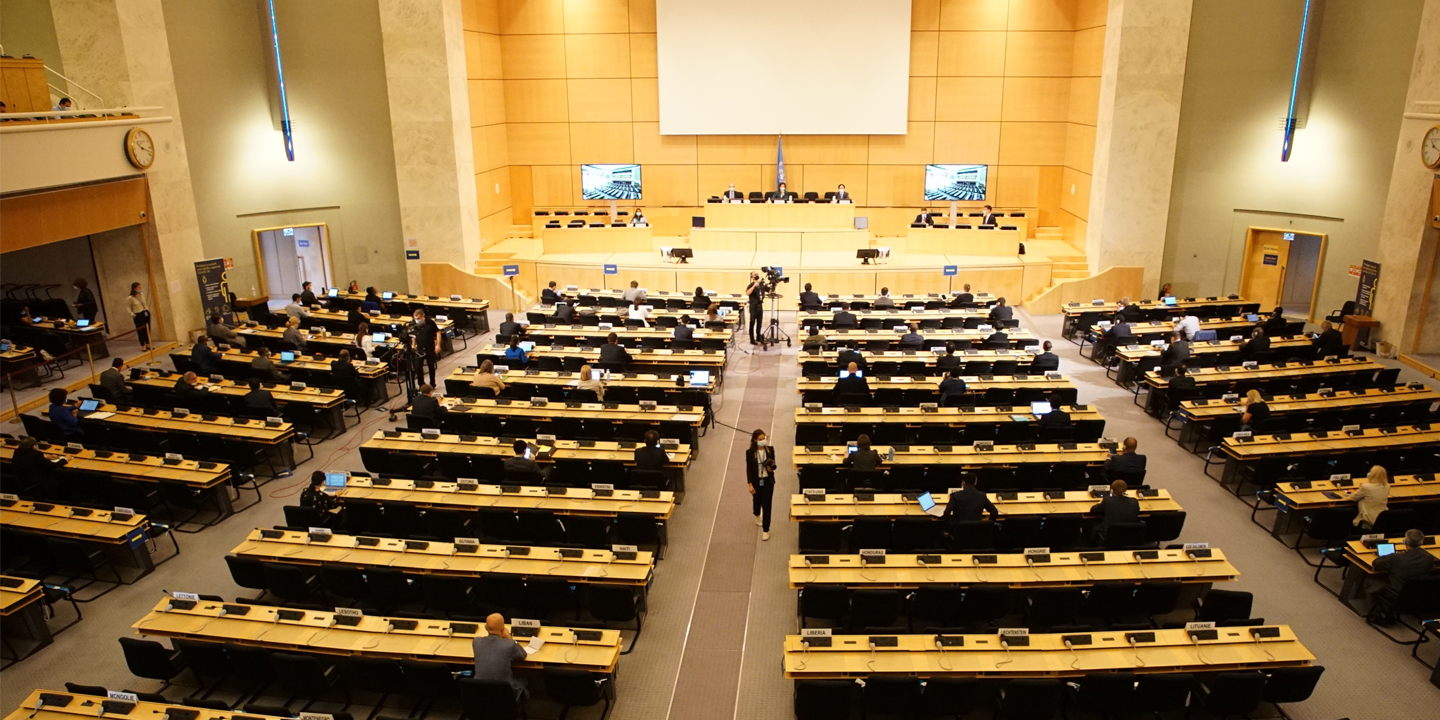

Atrocity Prevention and Outcomes of the Human Rights Council’s 43rd Session
The start of the 43rd regular session of the Human Rights Council (HRC) was held in Geneva between 24 February and 13 March 2020. Following a suspension due to the COVID-19 pandemic, the HRC resumed from 15 to 23 June 2020. As the primary international human rights body, the HRC has the capacity to prevent and respond to mass atrocity crimes, as systematic violations and abuses of human rights can be an indicator of potential genocide, war crimes, crimes against humanity or ethnic cleansing. The summary below highlights major outcomes and relevant dialogues from the 43rd session as they relate to the Responsibility to Protect (R2P) populations from such crimes. As part of the session, Rwanda delivered a statement on behalf of 53 members of the Group of Friends of R2P.
RESOLUTIONS
A/HRC/43/L.17 Situation of human rights in the Democratic People’s Republic of Korea
The HRC expressed deep concern at the systematic, widespread and gross human rights violations in the Democratic People’s Republic of Korea (DPRK) that in many instances constitute crimes against humanity, as described in the report of the Commission of Inquiry (CoI) on human rights in the DPRK. The HRC noted that the General Assembly (UNGA), in its resolution 74/166, recalled that the CoI had urged the leadership of the DPRK to prevent and suppress crimes against humanity and to ensure that perpetrators were prosecuted and brought to justice. The HRC invited the government of the DPRK to extend an invitation to the Office of the High Commissioner for Human Rights (OHCHR) to visit the country. The HRC decided to extend the mandate of the Special Rapporteur on the situation of human rights in the DPRK for a period of one year and requested the Special Rapporteur to submit regular reports to the HRC and the UNGA. The HRC also requested the High Commissioner to provide an oral update and a full written report to the HRC at its 46th session. The resolution recalled “the responsibility of the Democratic People’s Republic of Korea to protect its population from crimes against humanity.” The resolution was adopted without a vote.
A/HRC/43/L.23 Situation of human rights in Myanmar
The HRC expressed deep regret at the ongoing refusal of the government of Myanmar to cooperate with the Special Rapporteur on the situation of human rights in Myanmar and the denial of access to Myanmar since December 2017. The HRC welcomed the provisional measures order of the International Court of Justice in the case filed by The Gambia against Myanmar on the application of the Convention on the Prevention and Punishment of the Crime of Genocide. The HRC reiterated its call for the government to act on its commitment to open an OHCHR country office. The HRC decided to extend the mandate of the Special Rapporteur for a further period of one year. The HRC also requested the new mandate holder to present oral progress reports to the HRC at its 44th and 45th sessions and to submit a report to the Third Committee at the 75th session of the UNGA and to the HRC at its 46th session. The HRC further requested the Special Rapporteur to undertake thematic research with a view to monitoring the implementation of the recommendations made by the independent international fact-finding mission on Myanmar. The HRC also welcomed the Secretary-General’s initiative to take concrete action based on the recommendations contained in the report entitled “A brief and independent inquiry into the involvement of the United Nations in Myanmar from 2010 to 2018” (also known as the “Rosenthal Report”), and invited the Secretary-General to provide an oral update to the HRC at its 46h session on progress made to strengthen the prevention capacity of the UN system. The resolution was adopted by a vote of 37 in favor, 2 against and 8 abstentions.
A/HRC/43/L.26 Prevention of genocide
Recalling the 15th anniversary of the adoption of the 2005 World Summit Outcome, the HRC underlined the important role of the UN human rights system to contributing to a better understanding and early warning of complex situations that might lead to genocide. The HRC urged all states to implement universal periodic review recommendations relating to the prevention of genocide, war crimes and crimes against humanity. The HRC encouraged the Special Adviser on the Prevention of Genocide and the High Commissioner for Human Rights to further enhance the systematic exchange of information between their offices. The HRC requested the High Commissioner to convene, before the 46th session of the HRC, a one-day intersessional meeting on cooperation in strengthening capacities for the prevention of genocide. The HRC also requested the High Commissioner to prepare a summary report on the intersessional meeting and to submit it to the HRC at its 47th session. The HRC further invited the Special Adviser on the Prevention of Genocide to an interactive dialogue with the HRC at its 47th session. The resolution reiterated “the responsibility of each individual State to protect its population from genocide, which entails the prevention of such a crime, including incitement to it, through appropriate and necessary means.” The resolution was adopted without a vote.
A/HRC/43/L.29 Situation of human rights in South Sudan
The HRC stressed that those responsible for violations and abuses of international human rights law (IHRL) and violations of international humanitarian law (IHL) in South Sudan, including any that amount to war crimes or crimes against humanity, should be held accountable. The HRC urged the Revitalized Transitional Government of National Unity to establish all transitional justice institutions, including the Hybrid Court for South Sudan, the commission for truth, reconciliation and healing and the compensation and reparation authority. The HRC reaffirmed the mandate of the Commission on Human Rights (CoHR) in South Sudan, with continued emphasis on the need to establish the facts and circumstances of alleged violations and abuses of human rights, and welcomed the recommendations made by the CoHR on ending impunity and ensuring accountability. The HRC decided to extend the mandate of the CoHR for a period of one year and requested the CoHR to convene two workshops on transitional justice, with the participation of relevant stakeholders. The HRC requested the CoHR to present an oral update to the HRC at its 45th session during an enhanced interactive dialogue, with the participation of representatives of the African Union, and to present a comprehensive written report to the HRC at its 46th session during an interactive dialogue. The resolution recalled that “the Government of South Sudan has the responsibility to protect all of its population in the country from genocide, war crimes, ethnic cleansing and crimes against humanity,” and further recalled that, “the Government of South Sudan has the responsibility to protect all of its population in the country from any violations that may amount to crimes against international law, including war crimes and crimes against humanity.” The resolution was adopted without a vote.
A/HRC/43/L.33 Situation of human rights in the Syrian Arab Republic
The HRC recalled the statements made by the Secretary-General and the High Commissioner for Human Rights that crimes against humanity and war crimes are likely to have been committed in the Syrian Arab Republic. The HRC condemned ongoing serious human rights violations including torture, mass executions, enforced disappearances and arbitrary arrests perpetrated by Syrian authorities. The HRC further expressed its deepest concern at the findings of the Independent International CoI on the Syrian Arab Republic and deplored the lack of cooperation by the Syrian authorities with the CoI. The HRC decided to extend the mandate of the CoI for a period of one year and requested the CoI to provide an oral update to the HRC during the interactive dialogue at its 44th session, and to present an updated written report during an interactive dialogue at its 44th and 46th sessions. The HRC also requested the CoI, in accordance with its mandate, to urgently conduct a comprehensive, independent special inquiry into the recent events in Idlib province and surrounding areas to identify all those for whom there are reasonable grounds to believe that there were alleged violations and abuses of international human rights law, and to support efforts to ensure that perpetrators are held accountable. The HRC further requested the CoI to provide a full report on its findings, to be followed by an interactive dialogue on its special inquiry, to the HRC no later than its 44th session. The resolution demanded that “the Syrian authorities meet their responsibility to protect the Syrian population” and further stressed that “the primary responsibility to protect the Syrian population lies with the Syrian authorities.” The resolution was adopted by a vote of 27 in favor, 2 against and 18 abstentions.
A/HRC/43/L.36/Rev.1 Ensuring accountability and justice for all violations of international law in the Occupied Palestinian Territory, including East Jerusalem
The HRC expressed concern about reports by the independent international CoI on the protests in the Occupied Palestinian Territory (OPT), as well as fact-finding missions and boards of inquiry convened by the Secretary-General, regarding serious human rights violations and grave breaches of IHL, including possible war crimes and crimes against humanity. The HRC further expressed alarm that long-standing systemic impunity for violations of international law and stressed the need to ensure accountability for all violations of IHL and IHRL in order to end impunity, ensure justice, deter further violations, protect civilians and promote peace. The HRC requested the High Commissioner to report at the HRC’s 46th session on how all parties can implement the recommendations reviewed by the High Commissioner in 2017, including accountability and legal measures other states can take to ensure Israel and all other relevant parties respect their obligations under international law in the OPT, including East Jerusalem. The resolution was adopted by a vote of 22 in favor, 8 against and 17 abstentions.
A/HRC/43/L.38/Rev.1 Human rights situation in the OPT, including East Jerusalem
The HRC expressed grave concern at the continuing violations of IHL and the systematic violation of the human rights of the Palestinian people by Israel, the “occupying power.” The HRC demanded that Israel withdraw from the Palestinian territory occupied since 1967, including East Jerusalem, so as to enable the Palestinian people to exercise its universally recognized right to self-determination. The HRC condemned all acts of violence, including all acts of terror, provocation, incitement and destruction, especially the excessive use of force by the Israeli occupying forces against Palestinian civilians, particularly in the Gaza Strip, and demanded that Israel cease all practices and actions that violate the human rights of the Palestinian people, and that it fully respect human rights law and comply with its legal obligations in this regard, including in accordance with relevant UN resolutions. The HRC requested the High Commissioner to prepare a report on the allocation of water resources in the OPT, including East Jerusalem, and to recommend measures to ensure the implementation of equitable access to safe drinking water in the OPT, in accordance with international law, and to present the report to the HRC at its 48th session. The resolution was adopted by a vote of 42 in favor, 2 against and 3 abstentions.
A/HRC/43/L.40 Technical assistance and capacity-building to improve human rights in Libya
The HRC renewed its request to OHCHR to provide technical assistance and capacity-building to Libya to promote and protect human rights, to prevent violations and abuses of human rights, and to ensure accountability for such violations and abuses. The HRC further requested the High Commissioner to immediately establish and dispatch a fact-finding mission to Libya, and to designate experts to implement, in an independent and impartial manner, for a period of one year, the following mandate: to establish the facts and circumstances of the situation of human rights throughout Libya and to collect and review relevant information; to document alleged violations and abuses of IHRL and IHL by all parties in Libya since the beginning of 2016, including any gendered dimensions of such violations and abuses; to preserve evidence with a view to ensuring that perpetrators are held accountable; and to work in cooperation with the Libyan authorities, the League of Arab States, the African Union and the UN Support Mission in Libya. The HRC requested that the fact-finding mission present an oral update on its work and findings to the HRC at its 45th session during an interactive dialogue with the participation of the Special Representative of the Secretary-General for Libya, and present a comprehensive written report on the situation of human rights in Libya to the HRC during its 46th session. The resolution was adopted without a vote.
OUTCOMES OF INTERACTIVE DIALOGUES, DEBATES AND UPRS
Country-specific
-
- Interactive Dialogue on the High Commissioner’s report on ensuring accountability for all violations of international law in the OPT
- Interactive Dialogue on the oral update by the Special Rapporteur on Eritrea
- Interactive Dialogue on the High Commissioner’s report on Rohingya and other minorities in Myanmar
- General Debate on the High Commissioner’s oral update and country reports on Eritrea, Venezuela and Yemen
- Interactive Dialogue with the Special Rapporteur on the DPRK
- Discussion on the Secretary General’s oral update on the involvement of the UN in Myanmar
- Interactive Dialogue with the CoHR in South Sudan
- Interactive Dialogue with the CoI on Burundi
- Interactive Dialogue with the CoI on the Syrian Arab Republic
- Interactive Dialogue with the Special Rapporteur on Myanmar
- Oral update by the High Commissioner on the DPRK
- Oral update by the High Commissioner on Venezuela
- Enhanced Interactive Dialogue on oral updates by the High Commissioner and the expert team on Kasai on the Democratic Republic of the Congo
- Interactive Dialogue on the High Commissioner’s report on Libya
- High-level Interactive Dialogue on the human rights situation in the Central African Republic
- Country report of the High Commissioner on Afghanistan
- Outcomes of the Universal Periodic Review of Iraq
Thematic
-
- General Debate on country reports and oral updates of the High Commissioner for Human Rights
- General Debate on human rights situations that require the Council’s attention
- Urgent debate on current racially inspired human rights violations, systemic racism, police brutality against people of African descent and violence against peaceful protests
ESTABLISHMENT AND EXTENSION OF COMMISSIONS OF INQUIRY AND SPECIAL PROCEDURES
The HRC extended the mandate of the Special Rapporteur on the situation of human rights in the DPRK and the mandate of the Special Rapporteur on the situation of human rights in Myanmar for a period of one year.
The HRC established a fact-finding mission to Libya for a period of one year. The HRC also extended the mandate of the CoHR in South Sudan as well as the CoI on the Syrian Arab Republic for a period of one year.
Related Content


Atrocity Alert No. 434: Sudan, Ethiopia and the UN Human Rights Council
